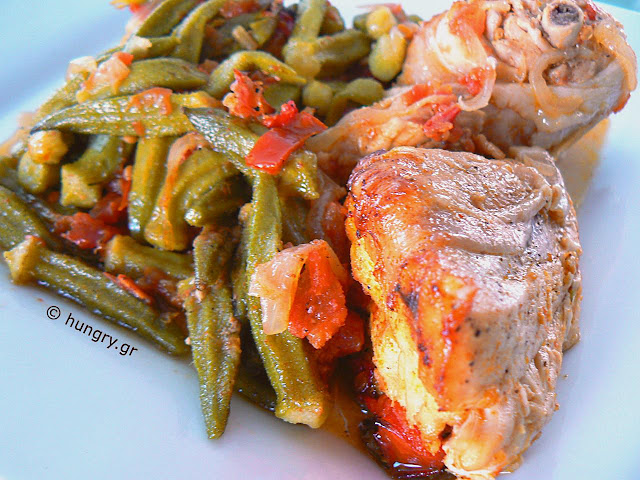
Chicken with okra, a delicious dish, that when cooked in a clay pot in the oven has an insurmountable taste.
Simple ingredients: tomato, onion and olive oil. The chicken combines perfectly with the vegetables, and is delicious and juicy.
Try it!
Simple ingredients: tomato, onion and olive oil. The chicken combines perfectly with the vegetables, and is delicious and juicy.
Try it!
| work: 1h:00′ | time: 3h:00′ | medium: |


Ingredients (~8 servings)
|

Wear plastic gloves and clean the okra, cutting around the conical peaks, removing the stem. It is a bit time-consuming method, but it will help to keep the okra intact through the cooking. |

Wash them and put them in boiling water with a shot of vinegar and ½ tsp salt and cook for one or two minutes. |

With a slotted spoon, remove the okra from the water they boiled in, and put them in a colander to drain well. |

Spread a baking sheet in a large oven pan. Spread the orka on the baking sheet. Put the pan in a preheated oven 200°C/ 390°F/ Gas 6 for 15 minutes to dry. Leave them aside until you need them. |
 Put the chicken pieces in a clay pot. Add the tomatoes, cut into small cubes, the onions, cut in crescents, and chopped chilli pepper. Scatter the allspice grains. Sprinkle with olive oil. Sprinkle with paprika and pepper. Put the clay pot in the oven at 200°C/ 390°F/ Gas 6 for one hour. |

After an hour remove the pot from the oven and check the food. Turn the chicken pieces on the other side. If necessary, add some hot water. |

Put the okra among the pieces of chicken. Reduce the temperature to 180°C/ 360°F/ Gas 4. Turn the pot in the oven and cook for 1 hour more. |

Towards the end of cooking remove the lid to brown the food. Allow to cool slightly and serve. |

The fresh okra is better to be small, freshly cut and without too many seeds.
This dish can be cooked with frozen okra. They are usually already cleaned, so the effort is less.
